- Featured
- Clean air
- Climate justice
- Consumer Rights
- Corporate Accountability
- Data access
- Early Childhood Development
- Economic fairness
- Education
- Electoral fairness
- Environmental justice
- Food justice
- Gender based violence
- Grants/social assistance
- Health
- Housing and infrastructure
- Industry interference
- Land Justice
- LGBTQIA+ rights
- Media/ information access
- Public transport
- Racism
- Reparations
- Safety
- Sanitation
- Service Delivery
- Sexual and Reproductive Rights
- Social justice
- Unemployment
- Womxn's rights/ gender equality
- Workers' rights
- More
-
Commit to improve your campus food environmentWe all need daily access to nutritious, safe, affordable and fresh foods, including nutritious meals, and this should not be just for the privileged few. We need effective food and nutrition standards that make nutritious food the norm, not a luxury. Bold policies are required to limit the reach and influence of the Food and Beverage industry, by restricting the advertising, promotion, and sponsorships of unhealthy foods on our campuses. We also call for food packs that are distributed on our campuses by various stakeholders, including the food industry, to be filled with nutritious food items that help us meet our dietary needs and support our well-being. Access to nutritious food is a basic human right, but many students across the country are unable to exercise this right. Affordable and nutritious food is beyond the reach of most students. Every day, there are thousands of students who struggle to eat a single nutritious meal while others do not eat at all. Thousands of students are left with no choice but to eat unhealthy foods that are nutritionally poor. Thousands of students are expected to make do with cheap and quick unhealthy foods and snacks from vendors inside and outside campuses. And the effect is that this lack of affordable, nutritious food on campus is compromising our academic performance and health. According to Section 27(1)(b) of South Africa’s Constitution, every person has the right to access sufficient food and water. Yet, on our campuses and in many of our communities, that right remains unrealised for countless students due to socioeconomic conditions and limited access to healthy, safe and affordable food. Studies show that over 60% of university students in South Africa face food insecurity [1]. These are not just statistics; they are everyday stories of missed meals, diminished focus, and delayed dreams. Together this is shaping a generation facing the long-term consequences of food insecurity and ill-health. However, it does not have to be this way. As a university leader, YOU hold the power to shift our campus from a state of mere survival to an environment where students can truly thrive and grow holistically. As Fix My Food, we are calling on university leadership to commit to meaningful dialogue with students to co-create solutions that ensure heathier food environments for all students. We are asking leadership to adopt the Fix My Food Campus Commitment to engage with students and commit to improvements in the campus food environment over the next 12 months that ensure: • Access on campus to healthy, affordable, nutritious foods every single day. • Effective food and nutrition standards that make nutritious food a reality. • Policies that restrict advertising, marketing, promotional events and provision of unhealthy foods to students on campus. As Fix My Food Advocates, we are asking the leaders of South African universities to stand up for food justice by creating and ensuring heathier campus food environments for all students. By signing onto the Fix My Food Campus Commitment, you are not just investing in student well-being; you are upholding a fundamental human right guaranteed to every individual in South Africa. Let us work together to build a country where access to affordable, nutritious food is not just a dream but a reality for all students. References [1] Higher Health 2021-2022 Annual Report: https://higherhealth.ac.za/wp-content/uploads/2023/03/2021-22-annual-report.pdf Please help us take a step closer to healthier campus food environments by completing a short survey about your campus food environment. Your experiences and insights will be used to further shape and strengthen the call for meaningful change. Follow this link to share your voice: https://wa.me/27832838313?text=FOOD To learn more about the Fix My Food movement, please visit: www.unicef.org/southafrica/fix-my-food766 of 800 SignaturesCreated by Fix My Food South Africa
-
Fair Food Systems Start With Honest, Unified Expiry Date LabelsFood date labelling may seem like a technical detail but in South Africa, it has real-life consequences. Every day, tons of perfectly edible food are thrown away simply because the labels are unclear. Meanwhile, millions of South Africans go hungry. A fragmented system of “Best Before,” “Sell By,” and “Use By” dates leaves people confused, cautious, or manipulated. What’s meant to protect consumers ends up doing the opposite - wasting food, enabling profiteering, and putting lives at risk. By demanding a single, unified expiry label, clearly stating “Safe to Eat Until”—we are not just calling for regulatory reform but we are standing up for food justice. This is about protecting health, respecting dignity, and making sure people are not misled by technical language that benefits corporations more than citizens. It's about giving ordinary South Africans the power to make informed choices without interpreting the jargon of food science. Governments and regulatory bodies may ignore isolated complaints but they cannot ignore a groundswell of united voices. When enough of us demand clarity, safety, and fairness, decision-makers will have no choice but to act. Join this petition to say: confusion is not protection, waste is not justice, and honesty should not be optional. Let’s change the system; one honest label at a time.70 of 100 SignaturesCreated by JX Gumede
-
Shoprite, theoša ditheko tša lena tša dijoMengwangeng ye e fetilgo, mekgatlo e mentši e ile ya ikopaganya go bea kgateletšo tabeng ya go oketšwa ga thušo ya tšhelete ya batho (social grants). Efela, tšhelete yeo e okeditšwego go di social grant e sale ye nnyane kudu ka gore ditshenyagalelo tša bophelo (cost of living) di godimo go fetiša. Grant ya R370 ga ya lekana go ka tšeya maeto a poledišano ya mešomo (job interviews), go thoma kgwebo, goba go lefelela dijo tšeo di ka fetšago kgwedi. Grant ya bana e ka tlase ga Food Poverty Line. Re bile le mo go lekanego ka taba ya gore dikgwebo tše kgolo tša dijo tša go swana le Shoprite di tšwele pele go ikgakantšha mabapi le taba ya gore ditheko tša bona tša dijo di godimo moo e le go gore setšhaba ga se kgone go ka lefelela. Ye ke kgato fela ya mathomo go rarabolola bothata bja tlala mo nageng ya rena. Go nale mo gontši kudu mo go sa swanetšego go dirwa. Bala ka botlalo ka taba moralong wa khomputara (website) ya Union Against hunger mo: https://unionagainsthunger.org/ Dula o lebeletše letlakala la rena la ditiragalo tša rena tšeo di lego kgaufi le wena mo: https://awethu.amandla.mobi/petitions/shoprite-bring-your-food-prices-down/events500 of 600 SignaturesCreated by Palesa Ramolefo

-
Shoprite, yehlisa amaxabiso okutya!Apha eminyakeni edlulileyo, kudala imibutho emininzi ye Civil Society inyanzelisa urhulumente ukuba anyuse iiSocial Grants. Kodwa nokuba bezinokunyuswa iiSocial Grants, azinokwenza mehluko ukuba izinga lokuphila siliyeka libenamaxabiso aphezulu ngoluhlobo.Ukuba izinga lempilo lizawubanamaxabiso aphakame ngoluhlobo, abantu bayawuhlala behluphekile kwaye bephila ngendlala. Kwale granti yeR370, ayonelanga ukuba abantu baye kwii interview semisebenzi okanye baqale amashishini abo. Le granti yeR370 ayonelanga ukuba abantu bathenge ukutya kwaye negranti yabantwana ingaphantsi komgca we ntlupheko (ukutsho oko ke ipoverty line). Sidikiwe ngoobhazabhaza beevenkile zokutya abazenza ngathi babakhathalele abathengi kodwa bahlala benyusa amaxabiso okutya naxa kungekho sizathu sokwenza njalo. Funda kabanzi nge Union Against Hunger kule website https://unionagainsthunger.org/ Hlala nathi kwi-events page yethu, ujonge ukuba akhomicimbi yenzekayo ongaza kuyo na https://awethu.amandla.mobi/petitions/shoprite-bring-your-food-prices-down/events https://www.youtube.com/watch?v=BljI1fBr2Ys References [1] Being part of the Shoprite team. https://www.shopriteholdings.co.za/careers/being-part-of-the-shoprite-team.html?p=6 [2] Shoprite CEO is SA’s best-paid retail boss as package hits R83m, by Nompilo Goba for Business Day, 15 October 2024. https://www.businesslive.co.za/bd/companies/retail-and-consumer/2024-10-15-shoprite-ceo-is-sas-best-paid-retail-boss-as-package-hits-r83m/#:~:text=At%20Shoprite%2C%20the%20CEO%20earns,%2C%20Clicks%2C%20Truworths%20and%20Spar. [3] Pick n Pay agrees to cap some prices amid investigations into alleged price gouging. Business Tech. 15 March 2021 [4] Advocate-Double-Discounted-List-of-Ten-Best-Buy-Foods. https://dgmt.co.za/wp-content/uploads/2023/10/Advocate-Double-Discounted-List-of-Ten-Best-Buy-Foods-V2-Online.pdf501 of 600 SignaturesCreated by Union Against Hunger

-
Shoprite, theola ditheko tsa dijo!Dilemong tse fitileng, mekhatlo e mengata e hahile khatello ea sechaba ea ho eketsa le ho tlatselletsa dithuso tsa sechaba. Empa leha re ka fumana dikeketso tse kgolo tsa dithuso tsa setjhaba tseo esale re di batla, ditjeho tsa bophelo di tla nyenyefatsa diphenyo tsena mme di boloke batho ba le bofutsaneng. R370 ha e lekane ho ea dipuisanong tsa mosebetsi kapa ho qala khoebo e nyane, re sa bue ka ho reka lijo tse lekaneng khoeli. Thuso ea grant ea Bana e ka tlase ho mola oa bofuma ba dijo. Re khathetse ke disuphamakete tse kang Shoprite tse iketsang eka di hlokomela bareki athe ba ka nyolla ditheko tsa bona tsa dijo ntle le ho bontša hore keketseho eo e nepahetse. Ena ke mohato o le mong feela oa ho rarolla bothata ba tlala bo teng naheng ena. Ho na le tse ding tse ngata tse ntseng di lokela ho etsoa. Bala haholoanyane ka eona webosaeteng ea Union Against Hunger mona: https://unionagainsthunger.org/ Dula u mametse leqephe la rona la diketsahalo ho bona hore na ho na le diketsahalo tse etsahalang ka hare le haufi le uena: https://awethu.amandla.mobi/petitions/shoprite-bring-your-food-prices-down/events https://www.youtube.com/watch?v=BljI1fBr2Ys References [1] Being part of the Shoprite team. https://www.shopriteholdings.co.za/careers/being-part-of-the-shoprite-team.html?p=6 [2] Shoprite CEO is SA’s best-paid retail boss as package hits R83m, by Nompilo Goba for Business Day, 15 October 2024. https://www.businesslive.co.za/bd/companies/retail-and-consumer/2024-10-15-shoprite-ceo-is-sas-best-paid-retail-boss-as-package-hits-r83m/#:~:text=At%20Shoprite%2C%20the%20CEO%20earns,%2C%20Clicks%2C%20Truworths%20and%20Spar. [3] Pick n Pay agrees to cap some prices amid investigations into alleged price gouging. Business Tech. 15 March 2021 [4] Advocate-Double-Discounted-List-of-Ten-Best-Buy-Foods. https://dgmt.co.za/wp-content/uploads/2023/10/Advocate-Double-Discounted-List-of-Ten-Best-Buy-Foods-V2-Online.pdf434 of 500 SignaturesCreated by Awethu.mobi

-
Shoprite, bring your food prices down!Over the years, many organisations have built public pressure to increase and top up social grants. But even if we get the significant social grant increases we have been demanding, the cost of living will undermine these victories and keep people in poverty. The R370 is hardly enough to travel to a job interview or start a small business, let alone buy enough food for the month. The Child Support Grant is way below the Food Poverty Line. We are tired of supermarkets like Shoprite pretending to care for consumers when they can increase their food prices without showing that the increase is justified. This is just one step to solving the current hunger crisis in the country. There is a whole lot more that still needs to be done. Read more about it on the Union Against Hunger website here: https://unionagainsthunger.org/ Stay tuned to our events page to see if any events are happening in and around you: https://awethu.amandla.mobi/petitions/shoprite-bring-your-food-prices-down/events https://www.youtube.com/watch?v=BljI1fBr2Ys References [1] Being part of the Shoprite team. https://www.shopriteholdings.co.za/careers/being-part-of-the-shoprite-team.html?p=6 [2] This is according to the Shoprite Group’s 2024 Annual Financial Statement, which put their profit at R6.2 billion at the end of 2024 and R5.9 billion at the end of 2023. https://www.shopriteholdings.co.za/docs/shp-afs-2024.pdf (Page 19). [3] Shoprite CEO is SA’s best-paid retail boss as package hits R83m, by Nompilo Goba for Business Day, 15 October 2024. https://www.businesslive.co.za/bd/companies/retail-and-consumer/2024-10-15-shoprite-ceo-is-sas-best-paid-retail-boss-as-package-hits-r83m/#:~:text=At%20Shoprite%2C%20the%20CEO%20earns,%2C%20Clicks%2C%20Truworths%20and%20Spar. [4] 15 million South Africans don’t get enough to eat every day: 4 solutions by The Conversation, 26 February 2025. https://theconversation.com/15-million-south-africans-dont-get-enough-to-eat-every-day-4-solutions-250700#:~:text=At%20least%2015%20million%20South,die%20from%20malnutrition%20each%20year [5] Pick n Pay agrees to cap some prices amid investigations into alleged price gouging. Business Tech. 15 March 2021 [6] Advocate-Double-Discounted-List-of-Ten-Best-Buy-Foods. https://dgmt.co.za/wp-content/uploads/2023/10/Advocate-Double-Discounted-List-of-Ten-Best-Buy-Foods-V2-Online.pdf * To reduce duplication, on 9 October 2025 we added approximately 17,268 signatures to this petition total. These additional signatures were from individuals from amandla.mobi's previous food prices campaign, who had not signed this petition, focused on Shoprite specifically. We have combined the signature total given the fact that this Shoprite petition has the same demands as amandla.mobi's food prices campaign launched in 2023. https://act.amandla.mobi/campaigns/food-prices-must-fall25,257 of 30,000 SignaturesCreated by Union Against Hunger

-
Young people support draft regulations to improve the food environmentThe introduction of FOPL and the restriction of the advertising of unhealthy foodstuffs to children will mark a significant achievement in promoting a healthier nation, and we are confident that these regulations will contribute to reducing the incidence of non-communicable diseases and their modifiable risk factors such as obesity which are linked to poor nutrition. Furthermore, we believe the implementation of these regulations would protect the health of millions of young South Africans by curbing the manipulative marketing tactics by the food industry which are targeted to lure in vulnerable groups like children into consuming unhealthy foodstuffs. We share the government’s vision of a South Africa where all citizens, regardless of their race, gender, or socio-economic background, have equal access to safe, nutritious food and are well-informed about what they are consuming. By implementing clear and accessible FOPLs, the government is taking a critical step toward ensuring that all South Africans can differentiate between healthy and unhealthy food products. This effort will not only protect vulnerable consumers but also foster a culture of transparency and accountability by the food industry. UNICEF South Africa, alongside other stakeholders, has consistently supported initiatives that safeguard the health of the youth, children, and vulnerable communities. The youth of South Africa echo this support and are hopeful that the finalisation and implementation of the R3337 regulations will soon become a reality. Thank you for your leadership and for considering our message of support. We look forward to the successful implementation of the R3337 regulations. Yours faithfully, The Youth of South Africa1,446 of 2,000 SignaturesCreated by Fix My Food South Africa
-
Say no to beer sales in food shops!South Africa rates 5th in the world in the amount of alcohol consumption among drinkers [1]. In addition, alcohol use plays a role in about half of all non-natural deaths [2]. Despite this, the alcohol industry continues to be bold and aggressive in its quest to increase the availability of alcoholic products and make more profits. The Beer Association of South Africa (BASA) in October started calling for beer to be sold at food shops [3]. This is in direct contravention of the National Liquor Act (2003), which prohibits the sale of alcohol other than natural wine at grocery stores and supermarkets. The association must be swiftly stopped in its tracks to protect South Africans from more alcohol harm. According to global trends, the government is supposed to be decreasing access to alcohol by limiting availability in the interest of public health. South Africa already has a disproportionate number of outlets for the population. Those who are supporting the move to allow beers into our food shops are supporting increased harm. If beer is made available in food shops, it will increase easy access and potentially come with discounts and special offers. Some will argue that individuals have the right to choose and take responsibility for their own health, but we know it is not that simple. Individual choice is influenced by the environment in which consumers find themselves. Beers on the shelves of our food shops will increase availability and send a message that beer is just another normal product, like milk, bread, and chocolates. But alcohol is not an ordinary commodity. Currently, South Africans who drink have an unhealthy relationship with alcohol. Statistics show that about one-third of people in South Africa aged 15 and above drink [4]. However, of those who drink, two-thirds drink to the point of intoxication (i.e., binge drinking), causing harm to themselves and others. This practice also diverts government resources away from development priorities like managing alcohol-related harm through policing, trauma admissions, social and disability grants and more. Our Health Minister has already issued a public plea for South Africans to reduce their ‘drinking sprees’ because of the excessive burden alcohol-related cases place on the healthcare system [5]. Already, the Health Ministry will have less budget available to it from next year because of budget cuts – it cannot afford to waste even more of its limited budget on a further increase in alcohol harm-related cases. COVID showed us that less alcohol availability means less trauma and fewer hospital admissions. It means a safer society for our people. This call by the liquor industry is irresponsible, showing a disregard for the health and welfare of the public and for the government purse. We call on everyone in Mzansi to support our call for #NoBeersInSAFoodshops. By signing this petition, you are joining us in saying we do not need beer in our food shops, there are enough places to buy beer. #NoBeerSalesInSAFoodshops #HandsOffLiquorAct #AlcoholSaferSA References: [1] https://www.who.int/publications-detail-redirect/9789241565639 [2] Parry South Africa: alcohol today. Addiction. 2005;100(4):426–9. [3] https://www.iol.co.za/weekend-argus/news/beer-association-wants-beer-to-be-sold-in-supermarkets-347d921a-068b-4697-85b8-00b521a3b1fc#:~:text=Cape%20Town%20%2D%20With%20more%20than,at%20grocery%20stores%20and%20supermarkets. [4] https://substanceabusepolicy.biomedcentral.com/articles/10.1186/s13011-018-0182-1 [5] https://www.news24.com/news24/southafrica/news/drinking-sprees-bird-flu-and-cost-cutting-health-minister-joe-phaahla-worried-over-public-healthcare-20231012.153 of 200 SignaturesCreated by SAAPA
-
Treasury did big sugar businesses influence your decision?On the 1st of April, the day the HPL increase was to start, Treasury issued a statement postponing the increase [1]. Treasury did not justify this last-second decision, which has raised concerns about what evidence was used to make this decision. Did Treasury choose to put profits before health by agreeing to the demands of the sugar industry? The sugar industry has a conflict of interest when it comes to the sugary drinks tax. That's why it is important Treasury reassure the public that the sugar industry did not influence their decision. The sugar industry has used its power and resources to attack the sugary drinks tax [2]. HEALA has called on Treasury to provide the research and information that was used to make the decision to delay the HPL increase by a year. HEALA has also called on Treasury to confirm whether they engaged with the sugar industry and its associates. If so, in the interest of transparency, Treasury must share meeting minutes and records of engagements and communication with industry. But Treasury has refused to respond to HEALA. The organisation had to resort to submitting a Public Access to Information Act (PAIA) application, but the deadline to respond has come and gone. But if enough of us come together, we can turn up the public pressure on Treasury to be transparent and accountable when it comes to decision-making processes which greatly impact the health of millions of people in South Africa. [1] Media Statement: Release of Revised Draft Rates and Monetary Amounts and Amendment of Revenue Laws Bill. National Treasury. 1 April 2022. [2] Well-conceived sugar tax needs further strengthening to save lives of millions. By Mikateko Mafuyeka and Petronell Kruger for Daily Maverick. 22 September 2022.48 of 100 SignaturesCreated by HEALA

-
Stop closed door meetings between government and big businesshttps://youtu.be/nuVHJT_rhgI Imagine your teacher smoking in the classroom. For some of us, this was the reality until new rules were put in place by government in 1993 [6]. But why had government not acted sooner? In their paper published in 2003, Mia Malan and Rosemary Leaver outline the relationship between the biggest tobacco business and government [7] [8]. Government eventually put public health before profits, thanks to the work of health advocates. But big businesses are still using their power to protect their profits at our expense. Researchers have pointed out that big businesses have worked to delay and delegitimize important health policies by using their associations and different strategies [9]. Researchers and civil society groups are not allowed to attend a standing meeting between the National Department of Health and big food businesses [9]. State capture has shown us we have a lot of work to do. But we are making some progress in improving transparency and accountability. Politicians have to declare financial interests [10], and political parties now must disclose who funds them [11]. We need to keep building on this momentum. We can't afford to have a repeat of 2014 where big businesses that make food like polony did not agree with government's proposed hygiene rules and instead wanted to self-regulate [12] [13]. Government should have stood up to those big businesses in 2014 and put the new rules in place anyway. Government has to stand up to big business bullies. Their job is to serve the people, not private interests. References can be found here: https://amandla.mobi/big-business-bullies-references8,399 of 9,000 SignaturesCreated by amandla mobi member

-
We need unhealthy food warning labels so we know which foods threaten our healthShops across South Africa are filled with pre-packaged foods that are processed with high levels of added sugars, salt, and saturated fats. A diet high in sugar, sodium or saturated fat can increase the risk of developing life threatening diseases such as diabetes, heart disease and some cancers. Easy to read food front-of-package warning labels can help consumers quickly, easily, and correctly identify foods high in nutrients of concern, such as excess salt, fat and sugar. The good news is the Department of Health is considering warning labels, and could start the process of implementing them by opening public comment. But already big food companies are trying to lobby against these warning labels [1]. But if enough of us come together, we can help ensure the department puts our health first, not corporate profits. We believe that we, not the food and drinks industry, have the right to decide what we are willing to put in our bodies. The people of South African deserve to know what is in our food. References: [1] https://www.dailymaverick.co.za/article/2022-05-30-heres-why-you-should-care-about-the-food-industry-lobbying-the-health-department-behind-closed-doors/1,074 of 2,000 SignaturesCreated by HEALA

-
Call on SA Government to Back Mass Farmer Strike in India!Since the 26th of November 2020, tens of thousands of farmers have camped near the border of New Delhi, the Indian capital. On that day, an alliance of national trade union federations called a nationwide strike which converged with a march on Delhi by the All India Kisan Sangharsh Co-ordination Committee (AIKSCC), a united front of over 250 farmer organisations. Large parts of the country came to a halt as direct action was undertaken. Protesting farmers were met with unacceptable police brutality - blockades, teargas, baton charges and water cannons - in a bid to prevent them from reaching the centre of Delhi. In South Africa we are all too familiar with the use of brutal police tactics to suppress popular protest and we condemn the use of these tactics against our comrades in India. The striking farmers have declared that they will not return home and the strike will not cease until the agriculture laws are repealed entirely. They will not be moved and we salute their resolve. India’s agriculture industry employs more than half of its population of nearly 1.4 billion people. The country is in the middle of an unprecedented economic decline, experiencing the worst recession in nearly 30 years. Socio-economic inequality is staggering. As South Africans we are also aware of how closely-linked unemployment and socio-economic inequality is to hunger. India’s new agriculture laws were passed despite a lack of consultation with agriculture experts and the leaders of farmer organisations. These laws threaten the acquisition of produce by state-run organisations at a fixed Minimum Support Price. What this means is that small producers have little bargaining power in the free market system and fear that large corporations will take advantage of this, forcing farmers to sell their produce at a lower price than the price which had previously been guaranteed to them by the government. The laws come at a time where there is increasing conflict and disagreement between farmers and the state, on account of the government turning a blind eye to farmers’ demands for better crop prices, additional loan waivers and irrigation systems to guarantee water in times of drought. They are also framed by the horrific numbers of Indian farmers who have been driven to suicide by debt. All of this is happening within the context of carbon capitalism which is putting the future of humanity in jeopardy and exposing the most vulnerable among us to the effects of the climate crisis. In South Africa, in India and across the world, corporations are not the solution – they are part of the problem. The methods of small scale farmers across the world will not only feed the people, but will also build resilience in the face of the climate crisis. The protection of the knowledge and practices of indigenous communities at the forefront of this movement is also paramount. In the face of oppression and systems of exploitation that stretch across borders, it is necessary for us to globalize resistance and join hands to push back against oppressive policies which threaten the lives of the most vulnerable. Amandla! Inquilab Zindabad!172 of 200 SignaturesCreated by South Africans Against Fascist India

.png)
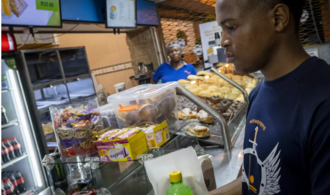
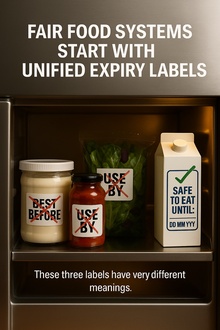
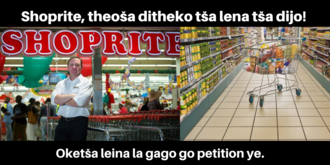
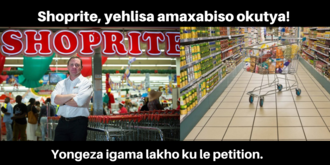.png)
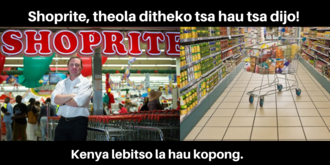
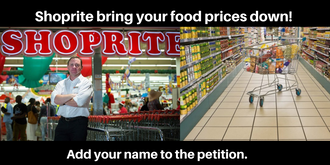.png)
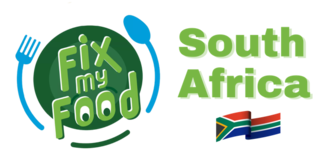
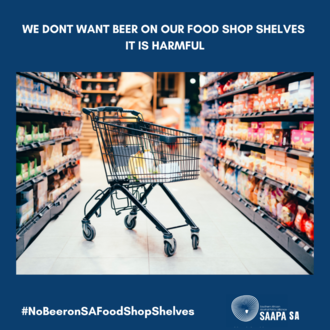
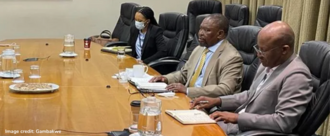


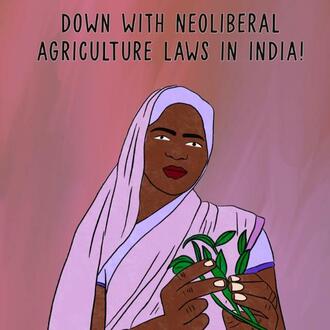.jpg)